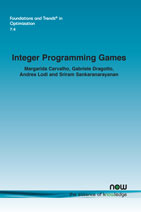Integer Programming Games
By Margarida Carvalho, Université de Montréal, Canada, carvalho@iro.umontreal.ca | Gabriele Dragotto, Princeton University, USA, gabriele@dragotto.net | Andrea Lodi, Cornell Tech, USA and Technion - Israel Institute of Technology, Israel, andrea.lodi@cornell.edu | Sriram Sankaranarayanan, Indian Institute of Management Ahmedabad, India, srirams@iima.ac.in
Abstract
We provide a comprehensive survey of Integer Programming Games (IPGs), focusing on both simultaneous games and bilevel programs. These games are characterized by integral constraints within the players’ strategy sets. We start from the fundamental definitions of these games and various solution concepts associated with them, and derive the properties of the games and the solution concepts. For each of the two types of games – simultaneous and bilevel – we have one section dedicated to the analysis of the games and another section dedicated to the development and analyses of algorithms to solve them. The analyses sections present results on the computational complexity of the general game as well as various other restricted versions. These sections also discuss the structural properties of the games and the equilibrium concepts associated with them. The algorithm sections, in contrast, present some of the state-of-the-art algorithms developed to solve these games, either exactly, approximately or fast under fixed-parameter assumptions. These sections also contain proofs of the correctness of these algorithms and an assessment of their theoretical run times in the worst-case scenario.
Integer Programming Games
This monograph provides a comprehensive survey of Integer Programming Games (IPGs), focusing on both simultaneous games and bilevel programs. These games are characterized by the integral constraints with their strategy sets.
The monograph starts with the fundamental definitions of these games and various solution concepts associated with them, and then derives the properties of the games and the solution concepts. For each of the two types of games – simultaneous and bilevel – one section is dedicated to the analysis of the games and another section is dedicated to the development and analyses of algorithms to solve them. The analyses sections present results on the computational complexity of the general as well as various restricted versions of the game. These sections also discuss the structural properties of the games and the equilibrium concepts associated with them. The algorithm sections, in contrast, present some of the state-of-the-art algorithms developed to solve these games, either exactly, approximately or fast under fixed-parameter assumptions. These sections also contain proofs of the correctness of these algorithms and an assessment of their theoretical run times in the worst-case scenario.
